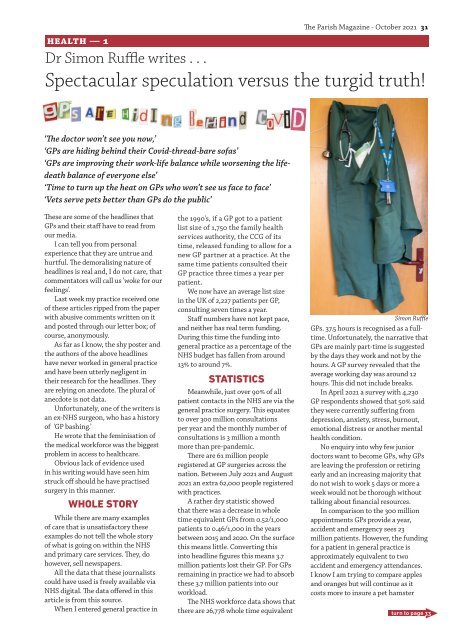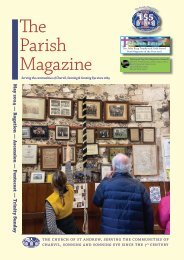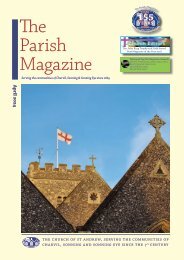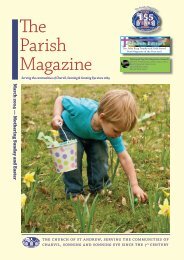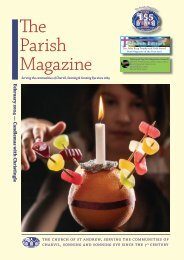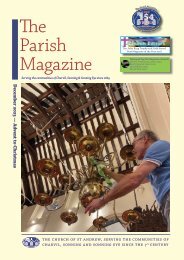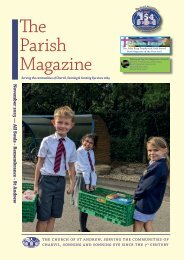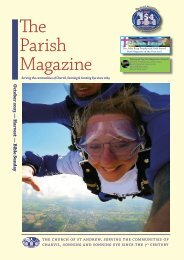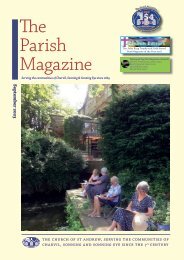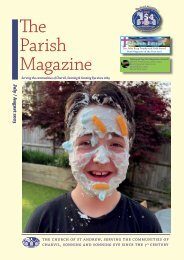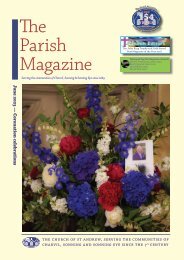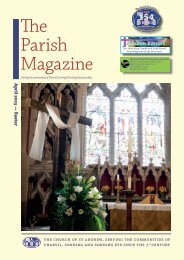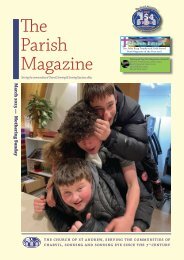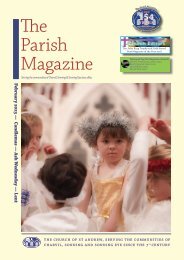The Parish Magazine October 2021
Serving Charvil, Sonning and Sonning Eye since 1869
Serving Charvil, Sonning and Sonning Eye since 1869
You also want an ePaper? Increase the reach of your titles
YUMPU automatically turns print PDFs into web optimized ePapers that Google loves.
<strong>The</strong> <strong>Parish</strong> <strong>Magazine</strong> - <strong>October</strong> <strong>2021</strong> 31<br />
HEALTH — 1<br />
Dr Simon Ruffle writes . . .<br />
Spectacular speculation versus the turgid truth!<br />
‘<strong>The</strong> doctor won’t see you now,’<br />
‘GPs are hiding behind their Covid-thread-bare sofas’<br />
‘GPs are improving their work-life balance while worsening the lifedeath<br />
balance of everyone else’<br />
‘Time to turn up the heat on GPs who won’t see us face to face’<br />
‘Vets serve pets better than GPs do the public’<br />
<strong>The</strong>se are some of the headlines that<br />
GPs and their staff have to read from<br />
our media.<br />
I can tell you from personal<br />
experience that they are untrue and<br />
hurtful. <strong>The</strong> demoralising nature of<br />
headlines is real and, I do not care, that<br />
commentators will call us 'woke for our<br />
feelings'.<br />
Last week my practice received one<br />
of these articles ripped from the paper<br />
with abusive comments written on it<br />
and posted through our letter box; of<br />
course, anonymously.<br />
As far as I know, the shy poster and<br />
the authors of the above headlines<br />
have never worked in general practice<br />
and have been utterly negligent in<br />
their research for the headlines. <strong>The</strong>y<br />
are relying on anecdote. <strong>The</strong> plural of<br />
anecdote is not data.<br />
Unfortunately, one of the writers is<br />
an ex-NHS surgeon, who has a history<br />
of 'GP bashing.'<br />
He wrote that the feminisation of<br />
the medical workforce was the biggest<br />
problem in access to healthcare.<br />
Obvious lack of evidence used<br />
in his writing would have seen him<br />
struck off should he have practised<br />
surgery in this manner.<br />
WHOLE STORY<br />
While there are many examples<br />
of care that is unsatisfactory these<br />
examples do not tell the whole story<br />
of what is going on within the NHS<br />
and primary care services. <strong>The</strong>y, do<br />
however, sell newspapers.<br />
All the data that these journalists<br />
could have used is freely available via<br />
NHS digital. <strong>The</strong> data offered in this<br />
article is from this source.<br />
When I entered general practice in<br />
the 1990's, if a GP got to a patient<br />
list size of 1,750 the family health<br />
services authority, the CCG of its<br />
time, released funding to allow for a<br />
new GP partner at a practice. At the<br />
same time patients consulted their<br />
GP practice three times a year per<br />
patient.<br />
We now have an average list size<br />
in the UK of 2,227 patients per GP,<br />
consulting seven times a year.<br />
Staff numbers have not kept pace,<br />
and neither has real term funding.<br />
During this time the funding into<br />
general practice as a percentage of the<br />
NHS budget has fallen from around<br />
13% to around 7%.<br />
STATISTICS<br />
Meanwhile, just over 90% of all<br />
patient contacts in the NHS are via the<br />
general practice surgery. This equates<br />
to over 300 million consultations<br />
per year and the monthly number of<br />
consultations is 3 million a month<br />
more than pre-pandemic.<br />
<strong>The</strong>re are 61 million people<br />
registered at GP surgeries across the<br />
nation. Between July <strong>2021</strong> and August<br />
<strong>2021</strong> an extra 62,000 people registered<br />
with practices.<br />
A rather dry statistic showed<br />
that there was a decrease in whole<br />
time equivalent GPs from 0.52/1,000<br />
patients to 0.46/1,000 in the years<br />
between 2015 and 2020. On the surface<br />
this means little. Converting this<br />
into headline figures this means 3.7<br />
million patients lost their GP. For GPs<br />
remaining in practice we had to absorb<br />
these 3.7 million patients into our<br />
workload.<br />
<strong>The</strong> NHS workforce data shows that<br />
there are 26,778 whole time equivalent<br />
Simon Ruffle<br />
GPs. 37.5 hours is recognised as a fulltime.<br />
Unfortunately, the narrative that<br />
GPs are mainly part-time is suggested<br />
by the days they work and not by the<br />
hours. A GP survey revealed that the<br />
average working day was around 12<br />
hours. This did not include breaks.<br />
In April <strong>2021</strong> a survey with 4,230<br />
GP respondents showed that 50% said<br />
they were currently suffering from<br />
depression, anxiety, stress, burnout,<br />
emotional distress or another mental<br />
health condition.<br />
No enquiry into why few junior<br />
doctors want to become GPs, why GPs<br />
are leaving the profession or retiring<br />
early and an increasing majority that<br />
do not wish to work 5 days or more a<br />
week would not be thorough without<br />
talking about financial resources.<br />
In comparison to the 300 million<br />
appointments GPs provide a year,<br />
accident and emergency sees 23<br />
million patients. However, the funding<br />
for a patient in general practice is<br />
approximately equivalent to two<br />
accident and emergency attendances.<br />
I know I am trying to compare apples<br />
and oranges but will continue as it<br />
costs more to insure a pet hamster<br />
turn to page 33


